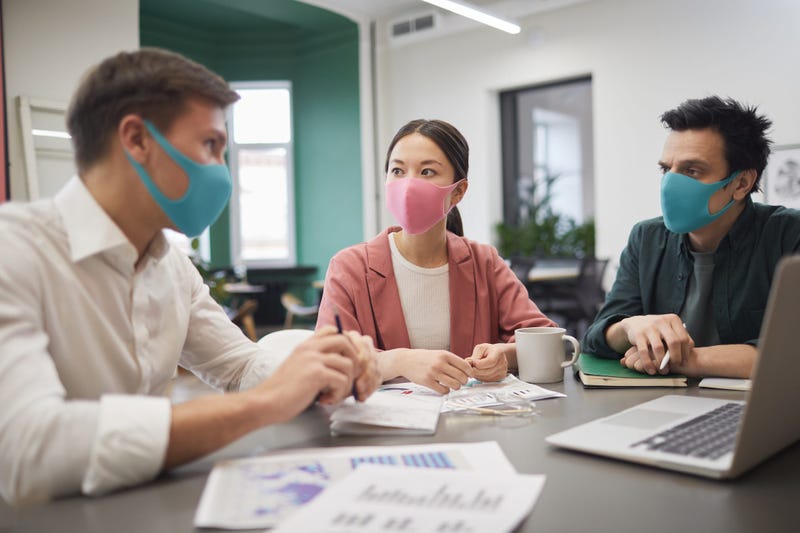Governor Laura Kelly has issued an Executive Order requiring that most Kansans must wear a mask while in public spaces, and in places where individuals are unable to maintain social distancing of six feet.
The order takes effect beginning 12:01 a.m. Friday, July 3, and will remain in place until rescinded or until the current statewide State of Disaster Emergency expires – whichever is earlier.
“The last few months have presented many new challenges for Kansans, and all of us want to return to our normal lives and routines,” Governor Kelly said. “Unfortunately, we have seen a spike in the number of COVID-19 cases, hospitalizations, and deaths across our state and our country. We must act. Viruses don’t stop at county lines. This order doesn’t change where you can go or what you can do. But wearing a mask is a simple and effective way to keep Kansans healthy and keep Kansas open for business.”
Under the order, Kansans are required to wear masks when inside any public space – including their workplace – or in situations where social distancing of six feet cannot be maintained. Guidance regarding specific places or situations in which masks are required is outlined within the order.
Kansans under five years of age, those with medical conditions, and others specifically outlined in the order are exempt from these requirements.
Under the new order, any person in Kansas shall cover their mouth and nose with a mask or other face covering when they are in the following situations:
- Inside, or in line to enter, any indoor public space
- Obtaining services from the healthcare sector in settings, including but not limited to, a hospital, pharmacy, medical clinic, laboratory, physician or dental office, veterinary clinic, or blood bank
- Waiting for or riding on public transportation or while in a taxi, private car service, or ride-sharing vehicle
- While outdoors in public spaces and unable to maintain a 6-foot distance between individuals (not including individuals who reside together) with only infrequent or incidental moments of closer proximity
All businesses or organizations in Kansas must require all employees, customers, visitors, members, or members of the public to wear a mask or other face-covering when:
- Employees are working in any space visited by customers or members of the public, regardless of whether anyone from the public is present at the time
- Employees are working in any space where food is prepared or packaged for sale or distribution to others
- Employees are working in or walking through common areas, such as hallways, stairways, elevators, and parking facilities
- Customers, members, visitors, or members of the public are in a facility managed by the business or organization
- Employees are in any room or enclosed area where other people (except for individuals who reside together) are present and are unable to maintain a 6-foot distance except for infrequent or incidental moments of closer proximity.
The following are exempt from wearing masks or other face coverings in the situations described:
- Persons age five years or under—children age two years and under in particular should not wear a face covering because of the risk of suffocation
- Persons with a medical condition, mental health condition, or disability that prevents wearing a face covering—this includes persons with a medical condition for whom wearing a face covering could obstruct breathing or who are unconscious, incapacitated, or otherwise unable to remove a face covering without assistance
- Persons who are hearing impaired, or communicating with a person who is hearing impaired, where the ability to see the mouth is essential for communication
- Persons for whom wearing a face covering would create a risk to the person related to their work, as determined by local, state, or federal regulators or workplace safety guidelines
- Persons who are obtaining a service involving the nose or face for which temporary removal of the face covering is necessary to perform the service
- Persons who are seated at a restaurant or other establishment that offers food or beverage service, while they are eating or drinking, provided they maintain a 6-foot distance between individuals (not including individuals who reside together or are seated together) with only infrequent or incidental moments of closer proximity
- Athletes who are engaged in an organized sports activity that allows athletes to maintain a 6-foot distance from others with only infrequent or incidental moments of closer proximity
- Persons who are engaged in an activity that a professional or recreational association, regulatory entity, medical association, or other public-health-oriented entity has determined cannot be safely conducted while wearing a mask or other face covering
- Persons engaged in an activity or event held or managed by the Kansas Legislature
- Persons engaged in a court-related proceeding held or managed by the Kansas Judiciary
- Persons engaged in any lawful activity during which wearing a mask or other face covering is prohibited by law
The governor is meeting with lawmakers Thursday afternoon to discuss this order. Local county commissioners can decide to not keep this order in place for their county.
“Mask or other face covering” means a covering of the nose and mouth that is secured to the head with ties, straps, or loops over the ears or is simply wrapped around the lower face. A mask or other face covering can be made of a variety of synthetic and natural fabrics, including cotton, silk, or linen. Ideally, a mask or other face covering has two or more layers. A mask or other face covering may be factory-made, sewn by hand, or can be improvised from household items such as scarfs, bandanas, t-shirts, sweatshirts, or towels.
“Public space” means any indoor or outdoor space or area that is open to the public; this does not include private residential property or private offices or workspaces that are not open to customers or public visitors

